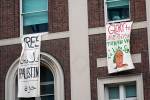Good and bad in health care in 2013
When you live in Las Vegas and think about health care, it’s often too easy at the end of the year to find something negative to focus on — a hepatitis outbreak caused by medical professionals not following basic precautions, a TB outbreak caused for the same reason.
Doctors caught reusing single-use probes. Hospitals with some of the worst infection rates in the nation.
It’s gone on for years. They are the reasons people pull out that sad joke: “Where do you go to get good health care in Las Vegas? The airport.”
2013, unfortunately, has been no different.
Still, there have been spectacular positives this year that we all should want to see continue.
That Las Vegas dentist Lee Turner is alive after a car accident once again speaks to the brilliance of the UMC trauma unit. It took 36 units of blood, and a series of operations by a team led by Dr. Terry Lewis, to help him overcome multiple internal injuries and a broken back. Turner left UMC Jan. 4 after more than a month in the hospital.
Although he said he has no memories of driving — he took the sleeping pill Ambien, which the FDA acknowledges can cause “sleep driving” — Turner said he’ll always remember that it was UMC that kept him alive.
When I saw him this month, he didn’t look like a man who had been in a near fatal accident.
So when you think of UMC, keep this statistic in mind: Of those who arrive at Nevada’s only Level 1 trauma center, 96 percent survive and are discharged. In recent years, trauma teams saved the life of a man who had a pole driven through his head and that of a biker who lost control at 90 mph. Both men have returned to work.
2013 also showed Southern Nevadans that they don’t have to leave town for the latest cancer-fighting drugs. That 83-year-old Mary Ann Hoban is alive may well be because of the ability of Comprehensive Cancer Centers of Nevada to land the latest clinical drug trials — more than 170 trials are underway locally in good part because of Comprehensive’s affiliation with both UCLA and the US Oncology Network.
I was on hand in September when Hoban received news from oncologist Dr. Heather Allen that her inoperable tumors were shrinking, probably because of the trial drug palbociclib.
“Are you sure?” a tearful Hoban said. “Yes,” said Allen as she hugged her patient.
Dr. Cy Stein, a researcher at the City of Hope Cancer Center in Los Angeles, said the reason trial drugs for treatment of prostate, bladder, kidney and testicular cancers come here before other U.S. cities is because of the presence of Dr. Nicholas Vogelzang on Comprehensive’s staff. Research firms seek the former head of the University of Chicago Cancer Research Center out, Stein said, because of his “commitment to excellence.”
That’s what we want Las Vegas to stand for.
But an August report by Families for Better Care showed that when it comes to nursing homes, Las Vegas stands for anything but excellence. Residents regularly suffer bed sores, malnutrition, injuries from falls. One resident died after being discharged too soon; another died after not having a bowel movement for days.
Nevada was one of two states where every nursing home was cited with at least one deficiency.
What is being done to our most frail of seniors is unconscionable. It has to stop.
What must also stop are the seemingly never-ending problems at Summerlin Hospital. Just last year the hospital ranked among the worst hospitals in the nation for its rate of deaths from serious treatable complications, a problem worsened by hospital acquired infections.
In 2006, a baby in the critical care unit died when given 1,000 times the amount of zinc she was prescribed.
In 2012, 72-year-old Marine Corps veteran Ivan Fankuchen contacted me to say he didn’t appreciate that his room was a breeding ground for infections, with filthy portable and permanent commodes and dirt and insects and dried food scraps part of the ambience. Summerlin executives never disputed his charges and after I wrote about his complaints, I received more than 50 similar complaints from former patients.
Given Fankuchen’s experience, maybe I shouldn’t have been surprised when state inspectors, in the wake of the recent TB outbreak at Summerlin Hospital, found that the facility didn’t take basic precautions to prevent infection in a critical care unit for babies. But I was. After all, it was a place where newborns were barely hanging on to life. Needless to say, I was stunned when Summerlin Hospital executives promised in writing that people with symptoms of infectious disease no longer would be able to visit a critical care unit for babies.
Why was it necessary to force a hospital to promise to take the most basic of precautions ?
When I learned of that action, I thought of Rodolfo Meana, the first man to die as a result of the 2007 hepatitis outbreak that affected thousands in Southern Nevada. Dr. Dipak Desai, the architect of the outbreak, was convicted of murder at a 2013 trial that news agencies reported around the world.
As his health worsened, Meana asked me a question about Desai and his colleagues that seems just as appropriate to ask of Summerlin health care workers who allowed a woman with a 103-degree temperature and a severe cough into the babies’ critical care unit.
“What kind of doctors and nurses,” he wondered, “would take chances with other people’s lives?”
Paul Harasim is the medical writer for the Las Vegas Review-Journal. His column appears Mondays. Harasim can be reached at pharasim@reviewjournal.com or 702-387-2908.


















